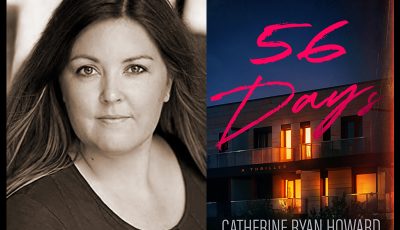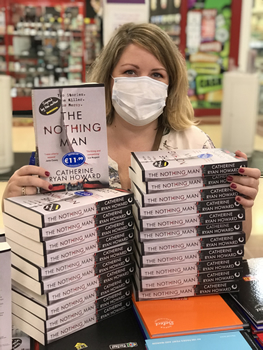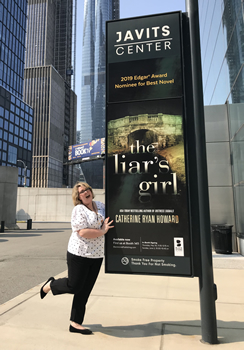

International Thrills: Catherine Ryan Howard
From ‘Untitled Lockdown Novel’ to 56 DAYS
When Catherine Ryan Howard sat down to write what will inevitably be called her “pandemic thriller,” it wasn’t really the pandemic she wanted to write about. Rather, Howard—a crime writer to her core—was interested in the phenomenon of lockdown, and what it might mean for two characters whose agendas might be well-served by isolation and confinement.
Oliver and Ciara, two young professionals who are new to Dublin, meet in a supermarket just as the pandemic is about to descend on Ireland. The pair hit it off, but fate soon throws them a curveball: to curb the spread of the virus, Ireland’s government is instituting a strict two-week lockdown, and socializing with anyone from a different household is off-limits. When Oliver asks Ciara to move in with him for the duration of lockdown, she agrees—it’s an opportunity to have him all to herself and get to know him without having to introduce him to her family and friends (or meet his). In fact, Ciara doesn’t tell a soul where she’ll be spending lockdown, or who she’ll be spending it with.
Things do not go as planned. At the beginning of the novel, a decomposing body is discovered in Oliver’s apartment; how it got there is only one of the mysteries that will unfold over the course of Howard’s book, which saves its most devastating reveal for its final pages. The story is teased out in two timelines: the present day, which follows a pair of Gardaí (Irish state police) as they investigate the gruesome discovery, and flashbacks that detail Oliver and Ciara’s meeting and courtship. While both are intensely sympathetic characters, it quickly becomes clear that at least one of them is harboring a dark secret.
In her latest talk with The Big Thrill, Ireland’s reigning queen of high-concept crime fiction touches on the line between twisting a plot and breaking it, the difference between Irish and American police, and surprising her editor with a lockdown novel.
What did your agent and editor say when you told them you were writing a novel set during the pandemic?
At first, I didn’t tell them. I let them think I was still writing the book I was supposed to be writing, which was going to be about a shooting in a nightclub. Because I knew that I had to show them what the book would be like. I couldn’t just say, “Can I switch to a pandemic novel?” because “pandemic novel” conjures up an entirely different kind of book in people’s minds than the one I was writing. In 56 DAYS, the unique circumstances of Ireland’s first lockdown—confined to our homes for the most part, unable to see anyone who didn’t live with you even outdoors, limited to a 2 km radius around your house—is just the setting. I also wanted to make sure the book worked. So I started writing, and by mid-June 2020, I had about 25,000 words and knew we were approaching a kind of event horizon: if they didn’t want me to write this, I had to start something else or I’d miss my deadline. So I came clean and sent them what I had. There was a meeting where everyone weighed in and the consensus was, “I didn’t think I wanted to read a lockdown novel, but I really enjoyed what you’ve sent and I want to know what happens next.” So off we went.
Can you tell me about the story spark that led to this book, without giving anything away?
For years I’d had a foggy idea in the back of my mind about a couple who meet but all is not what it seems. I knew what the truth was, and I knew the story would have to start with their meeting, but I had nothing but blank space in between. Then I heard England’s deputy health minister advise new couples to, essentially, break up or shack up in order to adhere to the “no mixing between households rule”—if you didn’t already live with someone, you weren’t supposed to see them at all during lockdown. And a lightbulb switched on in the back of the mind: the couple would meet shortly before the pandemic reached Ireland and decide to move in together when lockdown hit. My 2 km confined me to a part of Dublin city center, which I was seeing in a way that both terrified me and felt like a privilege—I could use what I was seeing. Ireland entered lockdown 1 on March 27, 2020, and I have a photo on my phone of a document open on my computer on April 17 with “Untitled Lockdown Novel” as the title—that’s how quickly I switched.

Howard in August 2020, spending a day in bookstores in her native Cork to sign copies of her bestseller The Nothing Man
I’m in awe of the book’s structure—you’ve got three POV characters and countless time jumps in both directions, and we frequently see the same scene from two different perspectives, gleaning vastly different information each time. Was it difficult to piece everything together? Were there any tools or techniques that were helpful?
One of the first things I did when lockdown hit Ireland was commence a Lost re-watch. I’m obsessed with plotting—or story architecture if we’re being fancy—and one of my favorite episodes by far is episode 7, season 2, “The Other 48 Days,” where we find out where the people in the tail of the plane have been since the day of the crash. That was the starting point for me for 56 DAYS: we’d start with the discovery of a dead body and then go back to the start, 56 days ago, when the couple meet, and move forward in time until the truth was revealed. I wanted readers to be wondering how on earth everything could have gone so wrong in such a short space of time, as well as slowly drip-feeding in other information that would, eventually, turn everything on its head. I used an Excel spreadsheet to keep track. It let me see the entire course of events at a glance and kept me on track for dates, how many days ago, events, etc.
We can’t talk much about Ciara and Oliver—doing so would lead us into spoiler territory. Instead, let’s talk about the two characters who are tasked with sorting out what happened in Oliver’s apartment: Detective Inspector Lee Riordan and Detective Sergeant Karl Connolly. How did they take shape for you, and did you always know you’d need them?
I love Lee and Karl. I don’t think I’ve ever had two characters come to me so fully formed. They came from a few places. I consider myself the first reader of my books, and I didn’t want to spend the entire book inside Oliver’s apartment. There needed to be some relief and also the story would benefit from someone on the outside, investigating what had happened at the apartment. I don’t normally write Garda (Irish police) characters—I prefer civilians—but the Gardaí were one of very few groups for whom the pandemic didn’t change much. They still had to go to work, and I thought seeing that contrasted with Oliver and Ciara, who were immediately able to start working from home with their laptops, would be interesting. There was a documentary on Irish television last year about the Gardaí called Inside the K which mostly seemed to follow Gardaí in their 20s and 30s, and what really came through was their personalities. None of them were what you’d expect. (I should point out—our police force are unarmed, and in general our feelings towards our Gardaí here are nothing like the feelings Americans might have towards facets of their law enforcement. An Garda Siochana means guardians of the peace.) I work with a serving Garda on procedure, etc.—she reads my drafts and points out what I get wrong—and one anecdote she told me really stuck out. I won’t spoil the introduction to Lee and Karl by telling you what it was, but it really does happen, often, and I just knew it had to go in a book. 56 DAYS was a Book of the Month pick for July so I’ve already had a lot of reader feedback, and many would like to see Lee and Karl come back. I don’t see that happening as I write standalones, but it’s nice to know that they’d like that. I wouldn’t mind spending another book with them.
What would you say to readers who might be reluctant to pick up a novel set during the pandemic?
The first thing I would say is that I understand. The pandemic, and in particular the timeframe of the novel, March/April/May 2020, was different for everyone, and it was wildly different country-to-country. I’m childfree, was already working from home, and my job was unaffected, plus the Irish government reacted swiftly and decisively—the leader of our country at the time had previously worked as a medical doctor. (We are a nation of about 5 million, and on the day we went into full lockdown, 27 March 2020, we’d had a total of 2,121 cases and 22 deaths. That’s how quickly they moved.) I cannot compare that experience to, say, someone who was in New York in those same months, hearing sirens at all hours of the day and night, or to people living in places where their leaders seemed indifferent or even in denial about the extent of the threat, or to anyone who lost a loved one to the disease or suffered from it themselves. And I never would.
But if you think you might want to read this book and are on the fence, I would say: lockdown is just the setting. No one gets sick. No one even gets tested. Ciara and Oliver do everything they’re supposed to do, they follow all the rules that were in place at the time, and this, combined with Ireland’s firm and quick response to rising case numbers, means that, for them, coronavirus is something that’s going on in the background. It is lockdown that they are experiencing, more so than a pandemic. Without giving too much away, I like to think of 56 DAYS as a story that would’ve happened anyway, but for me and for the characters, lockdown provided a unique opportunity for it to happen this way.
You’ve been called “the queen of high-concept crime fiction,” and over the course of five thrillers, you’ve made that claim difficult to dispute. How do you know if a concept has the legs it needs to carry it through an entire novel?
Thank you! I can’t really explain it; I just know. I’m not the kind of writer who has oodles of ideas and it’s a struggle to decide which one to start working on—I only ever have the one in progress and maybe one more. I think if I can see the major plot points in my head and I’m really excited to get going on writing it, that’s the idea to go with. I also sometimes have a feeling of, I can’t resist this idea. I have to write it. I felt like that about The Nothing Man and my feeling like that about 56 DAYS, despite the lockdown setting, was why I proceeded even though I wasn’t sure anyone would want to read it by the summer of 2021!
You write complex, twisty thrillers that come together like intricate puzzles. How do you make sure “complex” doesn’t become “convoluted”?
I think it comes down to how I write my books. I plan them in advance and when an idea comes to me, e.g., after just a few dates, a couple move in together for lockdown, it comes to me with the truth attached. As in, I always knew, in broad strokes, what kind of reveal was going to be at the end of 56 DAYS. So while I’m twisting and turning the plot, that keeps me bending rather than breaking it, if that makes sense. One of the worst TV shows I’ve ever had the misfortune to see was on Irish television a few years ago. It was about a girl who goes missing but, despite this, where she went or what happened to her was not explained at the end. (Don’t get me started—the creators said they wanted it to be like real life. But it was a TV show!) In between, the most ridiculous things happened, and it was because there wasn’t a “truth” to stick to. The creators couldn’t tell what were the bends and what were the breaks. That’s why I feel like knowing my endings is so helpful. To mention Lost again, you can tell when the writers were just making things happen for the sake of it and when they were genuinely revealing a clue to a mystery they knew the solution to. Also: my editor!
What books are stacked on your nightstand right now?
Survive the Night by Riley Sager and The Other Black Girl by Zakiya Dalila Harris are on there, as well as an ARC of A Flicker in the Dark by Stacy Willingham, out next year, which I’m really looking to. I also have John Colapinto’s About the Author in the stack—I read it years ago, before I got published, and I’ve been meaning to read it again. My next book is set on a movie set, so I’d been avoiding Elizabeth Little’s Pretty as a Picture until my first draft was done, to avoid any unconscious transference/total despair because I knew it was going to be good—but I’m about halfway through it now and woah, what a book. I am loving it. Marissa is an incredible character, and the insight into the life of a film editor is fascinating. Plus, it’s hilarious!
Can you tell me anything at all about what you’re working on now?
I’ve already given away that it’ll be set on a movie set. It was sparked by something my brother told me. He’s an actor, and he filmed an Irish horror movie, Beyond the Woods, a few years ago, at an isolated old farmhouse in the middle of the wintry Cork countryside. One of the first things the director had to do was visit the local Garda station to tell them, if you get reports of blood-curdling screams in the middle of the night, ignore them, because it’s just us filming. I immediately thought, if you wanted a murder to go undetected, a movie set might be just the place to do it…
- The Ballad of the Great Value Boys by Ken Harris - February 15, 2025
- Don’t Look Down by Matthew Becker - February 15, 2025
- The Wolf Tree by Laura McCluskey - February 14, 2025




